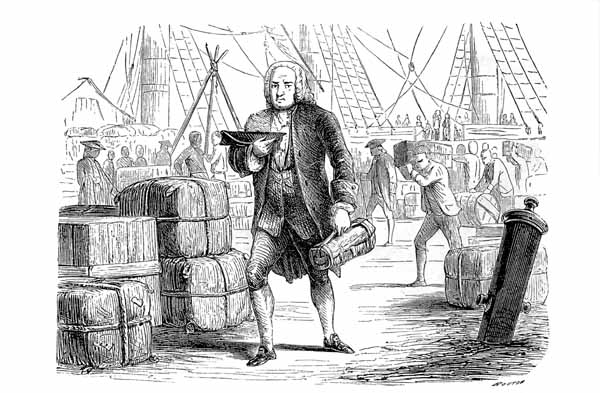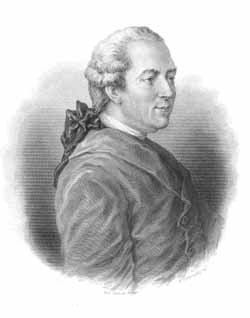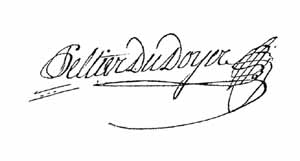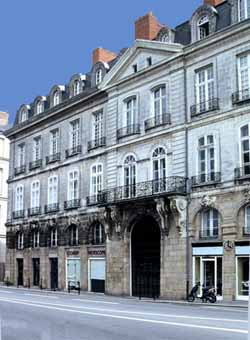|
|
||
|
|
||
|
|
|
The Peltier family (also known as Pelletier) originated from the old province of Aunis, which is today contained in the administrative areas of Charente Maritime and Deux Sevres. Branches of the family were from Batz and the island of Re, which is where Jean was born in 1734. In 1758, Jean, already Master of Arts, married Gabrielle Marie DU-DOYER in Gonnord, Anjou. She was the daughter of the Inspector of Taxes for the area. Jean was the son of a merchant specialising in maritime exchanges. The young couple settled in Nantes. To set them apart from other families of the same name, Jean took the name of Peltier-Dudoyer. Dudoyer was already a family connection through the marriage of one of Jean's ancestors.
In 1765 we find the name J.Peltier-Dudoyer on a rough copy of the Poujet list as being associated with Fremont, a ship- builder. It was usual for the name of the builder alone to figure in the column reserved for the seller. We can think it likely that Jean Peltier, then at the start of his career, and not having enormous reserves of capital, proposed that he and the ship-builder become associates for that particular boat. The first boat equipped by him was the Diligente, which set sail in 1771 for Guinea, followed by 16 further passages following the routes taken by the slave trade, a dozen of which took place between 1771 and 1775. He rapidly accumulated riches, his name appearing on the lists of principal owners of boat-yards in Nantes, where the ships' registers show his name for the fitting out 45 vessels - 15.245 tons, between 1771 and 1786. To reinforce his success, he moved house, from the quayside then known as the Hospital, later Moncousu, to a new development "Little Holland" on the isle of Feydau. He was a Free-Mason, a member of the St Germain Lodge of the Grand-Orient. He was ready to accept modern ideas. Though part of the gentry, he regarded nobles, for the most part, as leeches on society. A man of firm convictions, he maintained a strong interest in the upbringing and education of his children. Jean-Gabriel would often say: "My father made me old before my time by insisting on my studies". |
||
 |
||
|
His sons were students at the Oratory, Nantes, one of the best colleges at the time. Pupils were able to do exercises in literature and dramatic arts. It was a good environment to allow young people to develop their characters naturally. One become a pamphleteer and writer, another a corsair, another, perhaps a nephew, become a merchant.
|
||

Benjamin Franklin (Musée Dobrée) |
From 1771 onwards, Jean Peltier was busy in the transport of arms from Nantes, destined for use by the Navy in the ports of Lorient and Rochefort, having been manufactured by Jean-Joseph Carrier de Monthieu, in the Royal works at St. Etienne. Peltier's importance would not pass unnoticed among Benjamin Franklin's friends in later days. After a meeting with Franklin, passing through Nantes in 1776, he was won over to the American cause. Beaumarchais and Peltier were to send arms to the American revolutionaries long before the French authorities took up the cause. They got around the royal ban by sending the arms on a roundabout route via the West Indies, for transport on to the States by coastal vessels. In the next three years, one finds the name of J.Peltier-Dudoyer frequently cited in the letters of Benjamin Franklin. | |||
| June 1776, the King lent Beaumarchais one million royal pounds (minted at Tours ; their value was about three-quarters of that minted in Paris). The King of Spain provided a similar loan. It was thus that Beaumarchais set up the enterprise of ships' outfitters known as "Rodrigue Hortalez & Company", one of the shareholders being Monthieu. Owing to the lack of vessels, Beaumarchais had had to become an associate of professionals. Jean Peltier-Dudoyer became his agent at Nantes and a business associate when the need arose. There was a frequent correspondence between the two and also with Theveneau de Francy, a faithful associate of Beaumarchais. | ||
The period between 1778 and 1782 was the most fruitful for Jean Peltier-Dudoyer. With 7.205 tons of shipping at his disposal, he was the most successful ship-owner in Nantes. His fleet was modern, on average two years old, but he had the misfortune to have 13 of his ships captured by the British. One of those lost was the corsair, Zephir, which had been fitted out to accompany the Fier Rodrigue. Such well-known vessels as Amphytrite, the Aimable Eugénie (after Beaumarchais' daughter) or the Bonhomme Richard all were fitted out by Peltier-Dudoyer. In 1781 he broadened the scope of his business towards Mauritius. He sent off five vessels and the King of France acquired them from him at the Cape of Good Hope, following advance agreement, to act as supply ships for the military squadrons in the Indian Ocean. At this time he took on staff several nephews who proved to be good seamen. |
 |
|||
|
|
| Though the association with Monthieu appeared initially to be fruitful, it turned out to be a disaster. Beaumarchais severely criticised Monthieu : "Heaven help me from having to count on him for anything ... what a strange fellow our friend turned out to be!" |
||
| He was also in partnership with his son-in-law, Francois Michaud, with Carrier (or Carié) acting for the Count of Angevilliers, the Count of Estaing and the St Remy. Well-known in the New World by Arcadians, and by historians, Saint Rémy and Bon Papa were two of 7 vessels fitted out for King Charles III of Spain to take colonists to Louisiana in 1785. In later journeys, particularly in 1783, he took on board Arcadians as crew. |
| This was the start of Peltier's downfall. Thanks to Jean-Gabriel and his writings he was forced into exile in the East Indies between 1790 and 1792. He was thus no longer able to take charge of his business. He lost his possessions in St Dominica - estimated at 100,000 pounds. Jean Peltier-Dudoyer died at 69 in 1803 in Little Holland, Nantes, with a fortune reduced to 4,000 pounds, but having paid off all his debts - according to a judgment of the High Court of Rennes in 1788. His daughter, Francoise Michaud and one of his grandsons died in the same month, probably due to smallpox. Jean Gabriel says that their possessions were seized by Napoleon due to a hearing in London. The Peltier business only survived because of the work of Francois Michaud. The Peltiers, like many before them, lacking capital, took up the profession of shipmaster. 
---------------------------- -----------------------------Tugdual de LANGLAIS Translated by Judith-Ann MORRIS |
||
SOURCES: "Le commerce colonial Atlantique et la guerre d'indépendance des Etats-Unis d'Amérique 1778-1783" "J.-G. PELTIER, un journaliste contre-révolutionnaire", Hélène MASPERO-CLERC, "Annales de Bretagne" Tome 74, de Léon ROUZEAU. |
||

